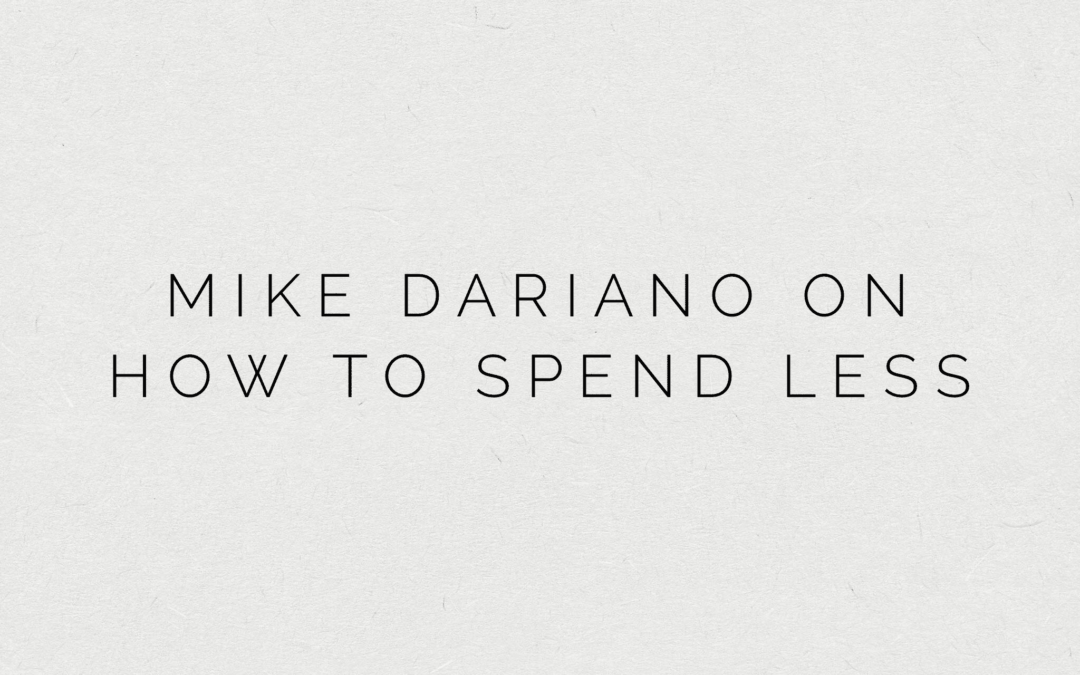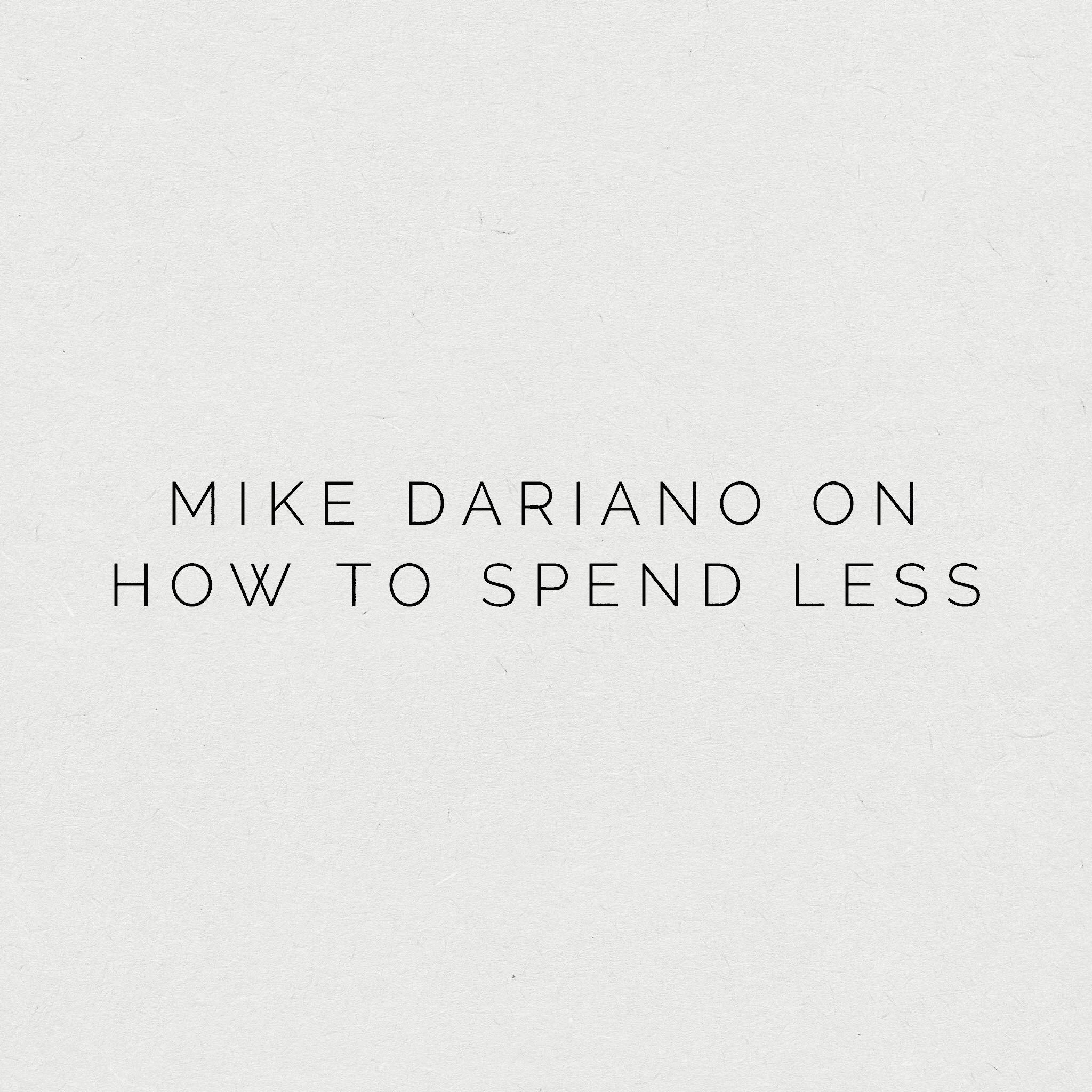One of my favorite bloggers, Mike Dariano, reached out a few weeks ago in response to an article I wrote titled Spending Too Much? Here’s What to Do.
Mike’s blog, The Waiter’s Pad, is a one of my go-to resources for learning. In a world saturated with amazing podcasts, Mike pulls out the best insights from hour-long conversations and converts them into a blog post I can read in five minutes.
Check it out and get on his email list so you don’t miss a thing.
Now, here’s Mike on how to spend less…
How to spend less.
Saving is a great idea, in fact, it may be the best one.
In Dan Egan’s podcast with Ted Seides, he said that saving $33 a month is worth one percent of alpha. Not only is that a huge return, but an easier one. Not ordering a few books from Amazon each month and using the library instead is simpler than choosing a money manager who can beat the market.
As Peter wrote in the post that inspired this one, “Getting the small stuff right is where people actually have the most trouble.” And we don’t spend enough time on the small stuff.
Researcher Brian Wansink authored the book Mindless Eating in an attempt to cut out a few hundred calories a day. Why so few? His reasoning was that system overhaul diets fade out because they’re incompatible with your lifestyle. Instead, small changes can sneak in without disturbing much else.
The question is, can we do the same thing with savings?
For starters, let’s redefine what we’re talking about. Forget calling this ‘Saving.’ From now on this is called ‘Prioritizing.’
Saving is passive, prioritizing is active. Saving feels restricted, prioritizing is empowering.
Again from Peter’s post, “Saving isn’t about making sacrifices. It’s about keeping your priorities and getting more of what you really want.”
Let’s call it that.
How to prioritize.
Impulse purchases are like picking your nose — the guilty party usually isn’t aware of it. If I need a new jacket and pants and add socks to my cart is that an impulse purchase?
Peter’s shopping list strategy leverages the power of habits to rewire our impulsive spending behaviors, but that still requires a lot of discipline. Another idea is doing all your shopping on Wednesday and buy whatever you need.
Marketer Rory Sutherland thinks this works for diets. Instead of counting calories, cut out whatever it is you’re not consuming — booze, carbs, candy — except for one or two days a week. “When it’s abstinence,” says Sutherland, “you can’t con yourself.”
Similarly, do your shopping one day a week. At our house the Amazon cart gets processed on Wednesdays. We can add things whenever but introducing that gap makes us reconsider the purchase.
Tracking purchases.
Ryan Nicodemus is an author who looked around his apartment one day and decided he had too much stuff. But where to begin? He decided the best solution was a “packing party.”
After inviting friends and ordering pizza, Nicodemus packed up everything he owned. After everyone left and evening entered, Ryan unpacked his toothbrush and toothpaste. Then he unpacked a set of sheets and pillow. As the week went on, he unpacked things only as he needed them.
What if we do that for your financials?
Cancel cable. Unfriend People (Magazine). Say Goodbye to Hello Fresh. Then add things in as you need them. Instead of mental accounting start from scratch.
Tracking financials is a pain. That’s also what makes a reverse budget so attractive.
Getting the big stuff right.
Small surpluses or debts compound into significant amounts. One year it’s a single dandelion, the next it’s a field of them.
Making the huge slightly less so is just as helpful. Two-thirds of our annual expenses are on food, transportation, and housing — yet we tend to make terrible decision on the last two.
No, not you of course, your decisions are well rationalized (after the fact). We’re bad decision makers about houses and cars because we make those decisions so infrequently.
This is why Butterball has a Turkey Talk-Line every November and December. It’s not because those people would rather tell you to turn your oven down than be with their families (well on further thought…). They’re there because we don’t know how to cook a Turkey in the oven.
There’s no “Toast Talk-Line” because at some point in our lives we’ve figured out how to make toast. We’ve had practice. Thanksgiving Turkeys and buying bungalows are not something we do often. They’re infrequent.
Though we don’t know what to do, we know how to do it — slowly. Nobel Prize winner Daniel Kahneman wrote this about decision making:
“If you’ve had a lot of experience in a particular domain you can trust yourself in that domain. If you’ve been able to learn from your mistakes. Otherwise in big decisions you might want to slow down.”
To recap:
- The name of the thing matters. ‘Yoga’ is popular, ‘stretching with others’ is weird.
- Starting from scratch is an easier starting point.
- You can’t lie about abstinence whereas everything else is gray area.
- Move slowly through the big things.















